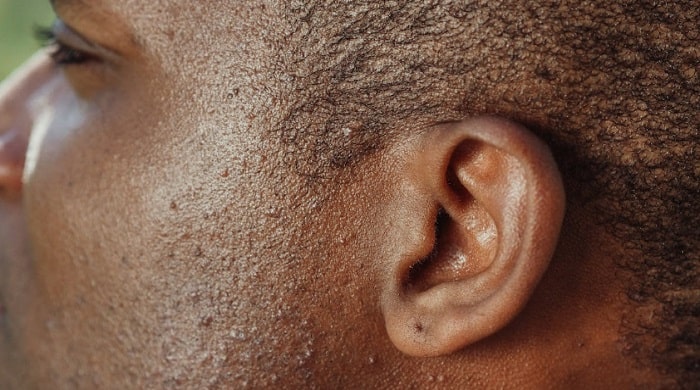A number of different things can be responsible for hearing loss. Let’s explore twelve common and less common causes.
Three Common Causes
1. Noise-Induced Hearing Loss
One very common cause of hearing loss is exposure to loud noise or sound.
Noise-Induced Hearing Loss is typically caused by continual exposure to high-decibel sounds over an extended period, such as working in a noisy environment like a construction site or frequently attending loud music concerts.
2. Age-Related Hearing Loss
Another common cause is presbycusis, which is age-related hearing loss.
As you get older, the hair cells in your inner ear that assist with hearing can slowly begin to break down and become less effective. That does not mean all people hear less as they get older, but it is a common occurrence.
3. Conductive Hearing Loss
Conductive hearing loss refers to any blockage or damage to the outer or middle ear that prevents sound from reaching the inner ear. Causes may include things like wax buildup, or more seriously, a punctured eardrum.
However, the good news is that a doctor’s intervention can often treat these issues and restore some, if not all, of your hearing.
Nine Less Common Causes
1. Ear Infections
Ear infections not only cause immediate pain. They can also lead to more serious issues if left untreated.
While less common than many other causes of hearing loss, ear infections do often result in temporary or permanent loss of hearing.
2. Some Medications, Such as Tepezza
Believe it or not, specific medications can also lead to hearing loss. They can damage the delicate structures within your ear that are responsible for both balance and sound perception.
One recent case of a medication causing hearing loss is that of Tepezza. People who suffer from thyroid eye disease, which causes bulging eyes and vision damage, have been taking the prescription drug Tepezza, developed by Horizon Therapeutics, for some time to help treat their condition.
However, a recent study has found that Tepezza may be linked to dangerous side effects, including tinnitus and hearing loss.
As a result, affected people have been joining the Tepezza mass tort claim lawsuit to seek compensation and hold Horizon Therapeutics accountable.
3. Meniere’s Disease
Though less common, Meniere’s disease can induce hearing loss. This chronic inner ear condition causes vertigo, tinnitus, and a feeling of fullness or pressure in one or both ears.
4. Acoustic Neuroma
Acoustic Neuroma is a rare cause of hearing loss. The condition involves a benign tumor growing on the main nerve that leads from your inner ear to your brain.
In addition to causing hearing loss, it can also lead to tinnitus and balance issues.
5. Autoimmune Inner Ear Disease
In very rare cases, your body’s immune system might mistakenly attack parts of your inner ear, which can potentially lead to hearing loss.
The condition is known as Autoimmune Inner Ear Disease.
6. Otosclerosis
Otosclerosis refers to abnormal bone growth in the middle ear, which could affect how sound travels from the outer ear to the inner one. This disturbance usually leads to a gradual decrease in hearing over time.
7. Sudden Sensorineural Hearing Loss
Although rare, sudden sensorineural hearing loss can occur quickly with little warning. It might happen overnight, causing you to wake up with significant hearing loss in one or both ears. The causes of SSHL can be various, including viral infections, trauma, or circulatory system disorders.
8. Cholesteatoma
This is a benign growth of skin cells that occurs in the middle ear. If left untreated, Cholesteatoma can lead to severe complications such as hearing loss or even facial paralysis.
9. Usher Syndrome
Lastly, Usher Syndrome is a genetic disorder that causes a combination of hearing loss and vision impairment. It is a leading cause of deaf-blindness.


















